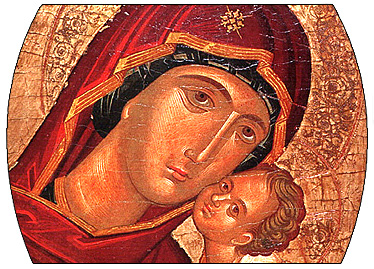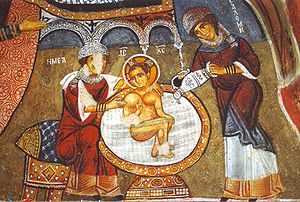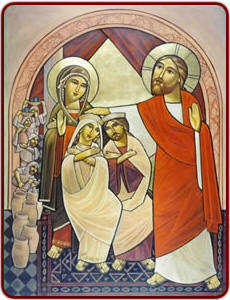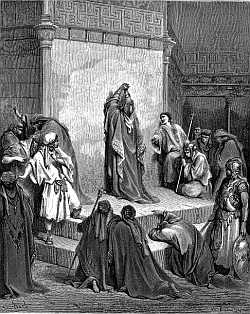Review of Avatar
It’s the connections of things. That’s what it is about Avatar, the James Cameron film. And I don’t mean in a Gaia, goddess, neo-gnostic, pagan kind of way. But it’s something else. The way they interacted with animals – the metaphor of actually plugging in – and what it suggests about how animals are. The way they plugged into the earth and with each other to the trees, not because they’re trees, but because it’s creation – it’s the same as with the animals. It situated them in creation. I really don’t respond other than with delight to the trees being connected as a network. All creation derives its meaning through man. But the fact that they were connected to the network too, that’s the story. The real story of us. That we are situated in creation by the economy of Christ – by God becoming a man, flesh of the womb of the Virgin, Adam’s flesh and Eve’s. Avatar gets it – the network is a network of trees sharing human memories – human souls, as well as their own. It isn’t connectedness that matters, but interconnectedness, of all things.

- Image by marcotruiz via Flickr
This has always been huge for me, but because it’s huge for mankind. When I wrote my first critique of environmentalism, this is what I was aiming at. When I write about the Economy of Christ and a lot of people don’t understand me outside our Faith, and some within don’t, this is what I mean too. The economy is all that is not God – all that is created – there’s nothing that is not God that is not created, including time – including history. And all that is created – all things that are not God – are created with one purpose, the salvation of man. The deification of man. The entire creation is God’s salvific act. The Economy is God’s action toward creation, and is the creation itself. And it culminates in God becoming part of creation, entering creation, entering time and history, taking flesh of our flesh – “plugging in” – but much more than that, by becoming us – the only act that would save. And by becoming us, he took in his body all minerals, plants, all elements, all history, all categories in which all creation participates. By becoming one of us, he summed up all creation, and brought it all together in one. His salvation is salvation of the animals, and of the plants, and of rock and stone, and of all things. Nothing is abandoned, nothing lost, nothing without participation in the glory. All things will be deified. All that is created or ever has been will become God. And by participation in him, by our own deification, we participate in that recapitulation of his.
People often don’t realize what this means. Simply saying that death will end, so we will not eat animals in the kingdom, is greeted with surprise. But saying that all things are being deified – everything – anything conceivable – anything that ever was or will be – that can shock and scare people. But it is our Faith. It is the meaning of existence, the very definition of creation. Creation *is* the Economy of Christ. Creator becoming creation *is* the gospel. And of course, if you ask the priests or the scholars, the decent ones who are not arrogant asses pursuing their own exaltation by trying to pick apart the holiness of this, they will all agree, of course. They will tell the people who don’t know, yes that’s right, of course, didn’t you know that is our faith?
But then to point out that this means that when we look at animals, we see, not in the same depth as we see in man, but still see Christ. We see them being deified. We see that they are not fodder, not machines. And then again, when we look at other living things, all living things, plants, trees, algae, we see deification, we see that which will become God. And then even, finally, in perhaps a wider radius, that which is inanimate matter, though we don’t really know as much about that as our scientific dogma pretends when it talks to us – I prefer to listen to the high level scientists talking to each other – they’re less dogmatic and arrogant about “the facts” that always turn out to be just the bare intelligence of public school science dogmatics and popularizers of Darwinism.
That which is rock and stone and mountain is not, as we may think, “dead” if by “dead” we mean it will be lost, has no value, or can be disregarded as profane or not sacred. All the earth, and all that is beyond it is sacred. The skies, the sun and moon, the mountain, the trees, the earth, and all that lives on it, and we – we are connected to it through Christ our saviour, the saviour of all creation, the deliverer of animals and trees from death, the redeemer of mountains and stars and stones and algae and insects and all that is, not merely all that lives. That, this kind of talk, at least in US circles, scares people of presumably “christian” faith. But theirs is not a “christian” faith, if they deny this.
To deny it is to deny that God became man. It is to say “not really”, “not in fulness”, “not entirely”. It is to deny as surely as the heretics and gnostics of old that Christ is one person with two natures. It is to “protect” Christ by insulating him from creation, and so severing our line to creation too, our ability to plug in, it is to separate and alienate us from creation so that we abuse it and do not consider it in our salvation, it is to set us against it and embrace death, not salvation from death, as the natural norm. It is to make distinction the basis of opposition. It is the heresy of all heresies. It is the language of hell. Francis Schaeffer’s book Pollution and the Death of Man is fantastic on this.
That’s why I put together my earlier essay on the topic – the pagan environmentalists are simply trying to defend the sanctity of creation by suggesting that “god” made it “out of” himself (or herself) – that it is deified in that way. But that’s not the only avenue to take. It’s damned close. We insist that God’s creation is through his energies (energia), which are uncreate, and are God. Not God’s essence but, still God. In that sense, yeah, God could be said to have created the cosmos out of himself, if you can also allow that he created it out of nothing, meaning that there was no pre-existing material that co-existed alongside God – because then, he’s not God at all, which is why the gnostics have to cook up a creative “demiurge” alongside him – where did the demiurge come from? What the pagans are not prepared to accept, partly from the influence of Darwinism corrupting their paganism, and making it pseudo-paganism, is Death, and how it came upon the world. They consider Death *part* of the natural order, not an alien infection upon it. And that’s their undoing. But the sanctity of creation *is* protected in the deification of all creation, as we insist. Paganism is a left turn into theoretical invention to accomplish something, unsuccessfully, which is already accomplished from the outset by the Creator. It’s just that a lot of people passing themselves off as “christian” and representing “christianity” aren’t really offering a Christian understanding of the Economy at all. What the pagans are really running up against is gnostics in “christian” media.
All of creation is sacred. We are saved through water, and through wine, and through bread, and through oil, through fishes and loaves, and through all things that participate in Christ. All things around us, everything that is, is a vehicle of our salvation and co-participant, and to be one with us, and one with God, so that all are one. This is the only Christian faith. Anything that detracts from it is a different “christ” – one who is either not God or not man, not creator or not creation, and then we are all lost, and all is hopeless and despair. It is Christ who joined creation and Creator, deifying the one by the other, in his one person by the two natures. To be of Christ at all is to participate in this joining – this interconnectedness.
Or else they make him creation but not God, and so then we are just men among men trying to be wise, and nothing has the power to connect us to all things or connect us and all things to God. And then creation is futile, because that which was created is not to be redeemed, and creation and redemption are irrevocably torn apart, and the Enemy is right that death is all that will be forever. And no faith is then true. All is nonsense, even disbelief becomes madness, and we are lost to chaos with no ground for our minds, and no ground for our bodies, and no ground for anything.
When I watch the blue movie, as I call it, I see it showing me how we are connected, but not insisting that I fall down and worship a god who did not become man, which cannot make all things one, or worship a god who is just a man, and can therefore give nothing meaning. True, it’s full of religious references, but not offensively. They’ve asked more than preached. And for this, I can live in the film.
And do you know what it means to someone who is alien even from aliens to be connected to all things? “No longer strangers. No longer aliens. Now, we are citizens with the Saints in the Kingdom of God.” For someone who has searched for meaning, for meaning all over, to find in Christ’s Incarnation that all things have been joined, united, put together? And for someone who suffers at the suffering of the world, the cosmos, the “groaning and travail” that is the slaughter, disease, warfare? It is a profound deliverance. Not that Avatar has given me that meaning – this is our Faith and always has been – but that I feel an immense and abiding joy when it is articulated visually.
Anyway, if you’ve seen it, see it again. And again. There’s so much detail, if you look. And do see it on the big screen. You have to be immersed in it, not spectating from outside when, at the end, they are all plugged in to the earth, to the roots of trees, and are seeking a transformation.
Oh, and yeah, if you were expecting the standard review with commentary on special effects, you can get that anywhere, so no.
![Reblog this post [with Zemanta]](http://img.zemanta.com/reblog_e.png?x-id=3209cf8d-31e6-4576-97e7-0cacdd17a378)
 Rejoice O Jerusalem. Keep the feast all ye who love Sion. Today, the ancient bonds of Adam’s condemnation hath been loosed. Paradise hath been opened unto us. The serpent hath been destroyed. He who deceived our first Mother of old, hath now seen a Woman become the Mother of the Creator. O the depths of the richness and the wisdom and understanding of God! For, the vessel of sin which brought death upon all flesh, hath become the beginning of salvation for the whole world through the Theotokos. For the all-perfect God hath been born of Her as a babe, and sealeth her Virginity by His birth . . .” – the Glory be, Holy Nativity, Tone 4 (from the All-Night Vigil)
Rejoice O Jerusalem. Keep the feast all ye who love Sion. Today, the ancient bonds of Adam’s condemnation hath been loosed. Paradise hath been opened unto us. The serpent hath been destroyed. He who deceived our first Mother of old, hath now seen a Woman become the Mother of the Creator. O the depths of the richness and the wisdom and understanding of God! For, the vessel of sin which brought death upon all flesh, hath become the beginning of salvation for the whole world through the Theotokos. For the all-perfect God hath been born of Her as a babe, and sealeth her Virginity by His birth . . .” – the Glory be, Holy Nativity, Tone 4 (from the All-Night Vigil)![Reblog this post [with Zemanta]](http://img.zemanta.com/reblog_e.png?x-id=e25b4687-7e77-4a63-b211-6127beab5f74)

![Reblog this post [with Zemanta]](http://img.zemanta.com/reblog_e.png?x-id=6ea949b6-e042-4416-b043-5dcfec87e83d)

![Reblog this post [with Zemanta]](http://img.zemanta.com/reblog_e.png?x-id=9a687c2f-5527-4623-93f1-035874a2938f)
 You know, in America, we’re all born into a culture of “once saved, always saved”. A Protestant-evangelical culture so strongly influenced by this tenet of Baptist religion, that even we Orthodox tend to think of ourselves as “in”, as somehow saved by affiliation, and somehow being of the Faith is reduced from a continual pattern of behavior to merely belonging to the right group.
You know, in America, we’re all born into a culture of “once saved, always saved”. A Protestant-evangelical culture so strongly influenced by this tenet of Baptist religion, that even we Orthodox tend to think of ourselves as “in”, as somehow saved by affiliation, and somehow being of the Faith is reduced from a continual pattern of behavior to merely belonging to the right group. I once told a friend that I was setting out on a journey to learn to love my wife. I believed that if I learned to love my wife, I would learn to love others. And if I can’t learn to love my wife, I told him, then I fear I will never learn to love anyone. My friend periodically, after long periods of time, writes to ask me if I’ve learned to love my wife. And I have always written back, “Not yet. I think it will take a long time.” Recently, I wrote to him to say:
I once told a friend that I was setting out on a journey to learn to love my wife. I believed that if I learned to love my wife, I would learn to love others. And if I can’t learn to love my wife, I told him, then I fear I will never learn to love anyone. My friend periodically, after long periods of time, writes to ask me if I’ve learned to love my wife. And I have always written back, “Not yet. I think it will take a long time.” Recently, I wrote to him to say: I was led to the Faith by a priest who had introduced many others to Orthodoxy as well. I began a series of discussions with a friend who hated Christianity, and over time, he began to soften. I introduced him to my priest, and he completed his conversion. He then began conversations with a younger mutual friend and led him to the Faith along with his wife and several children and became a godparent. They are all Orthodox now. I began another series of conversations, and created a reading society, for a man who likewise had great disdain for Christianity. He considered himself an academic, and I introduced him to the patristic writings of the Orthodox Fathers, the historical writings of Fr. John Romanides, and others. He decided to become a catechumen, and I took him to a priest, and that happened. I spoke with his wife also, and they both converted, received Holy Matrimony, and his children have became cradle Orthodox. In short, generations of people could be written as a geneology of movement into the Faith because of my mentor (and those who led him), and myself in my unworthiness. …
I was led to the Faith by a priest who had introduced many others to Orthodoxy as well. I began a series of discussions with a friend who hated Christianity, and over time, he began to soften. I introduced him to my priest, and he completed his conversion. He then began conversations with a younger mutual friend and led him to the Faith along with his wife and several children and became a godparent. They are all Orthodox now. I began another series of conversations, and created a reading society, for a man who likewise had great disdain for Christianity. He considered himself an academic, and I introduced him to the patristic writings of the Orthodox Fathers, the historical writings of Fr. John Romanides, and others. He decided to become a catechumen, and I took him to a priest, and that happened. I spoke with his wife also, and they both converted, received Holy Matrimony, and his children have became cradle Orthodox. In short, generations of people could be written as a geneology of movement into the Faith because of my mentor (and those who led him), and myself in my unworthiness. … “The deification or theosis of the creation will be realized in its fullness only in the age to come, after the resurrection of the dead. This deifying union has, nevertheless, to be fulfilled ever more and more even in this present life, through the transformation of our corruptible and depraved nature and by its adaptation to eternal life.” – Vladimir Lossky
“The deification or theosis of the creation will be realized in its fullness only in the age to come, after the resurrection of the dead. This deifying union has, nevertheless, to be fulfilled ever more and more even in this present life, through the transformation of our corruptible and depraved nature and by its adaptation to eternal life.” – Vladimir Lossky